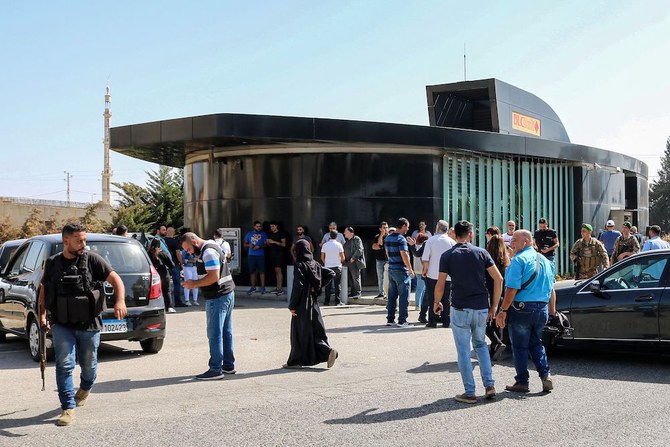BEIRUT: Outraged bank clients, at least two of them armed, stormed four commercial banks across Lebanon on Tuesday over withdrawal limits that have been imposed throughout the country amid a financial meltdown.
Cases of bank hold-ups have snowballed across Lebanon as residents have grown exasperated over the informal capital controls that banks have imposed since an economic downturn began in 2019.
On Tuesday morning, a Lebanese man armed with a pistol and a grenade entered the Chtaura branch of BLC Bank, demanding access to his $24,000 in savings, according to Depositors’ Outcry, a group campaigning for angry depositors.
The group said in a statement that the man, identified as Ali Al-Sahli, was in deep debt and also needed to wire money to his son, who was studying in Ukraine.
Al-Sahli, a retired officer who served in Lebanon’s Internal Security Forces, demanded $24,000 in trapped savings to transfer to his son, who owes rent and tuition fees in Ukraine.
“Count the money, before one of you dies,” Al-Sahli said in a video he recorded with one hand while waving a gun in the other.
“He had been trying to sell his kidney,” the group’s statement said.
Security forces later entered the bank and arrested Saheli before he could access any money, the group said.
BLC had no immediate comment.
المودع اللبناني علي الساحلي اقتحم مصرف BLC فرع #شتورة مطالباً بوديعته البالغة 24502 دولار https://t.co/DvOynai0T0 #العربية
— العربية (@AlArabiya) October 4, 2022
Also on Tuesday, a group of people employed at a state power station in Lebanon’s north stormed the First National Bank Branch in the port city of Tripoli, according to witnesses.
They were angry over delays in having access to their salaries and fees they were being charged for the process, said their union representative Talal Hajjer from outside the bank.
In a third incident, an armed depositor briefly took hostages at Byblos Bank in the southern city of Tyre, according to the Depositors’ Association, another advocacy group.
It said he was carrying a pistol and demanding access to his savings amounting to $44,000.
After negotiations with the bank, he agreed to take 350 million Lebanese pounds in cash — worth nearly $9,000 at Tuesday’s market rate — which he handed to a relative before being taken into custody, the Depositors’ Association said. There was no immediate comment from Byblos Bank.
A fourth depositor staged a sit-in at IBL Bank in the Beirut suburb of Hazmieh, saying he would not leave until he was granted unfettered access to his account, Depositors’ Outcry said. It was not immediately clear if he was armed.
Last month, a spree of seven hold-ups in a single week saw the banking association announce a closure for about a week.
Five incidents have already rocked banks this week. On Monday, Lebanese depositor Zaher Khawaja and some associates managed to withdraw $11,750 from an account with more than $700,000 at the Haret Hreik branch of BLOM Bank.
BLOM said he was not armed and that it would investigate the incident.


























